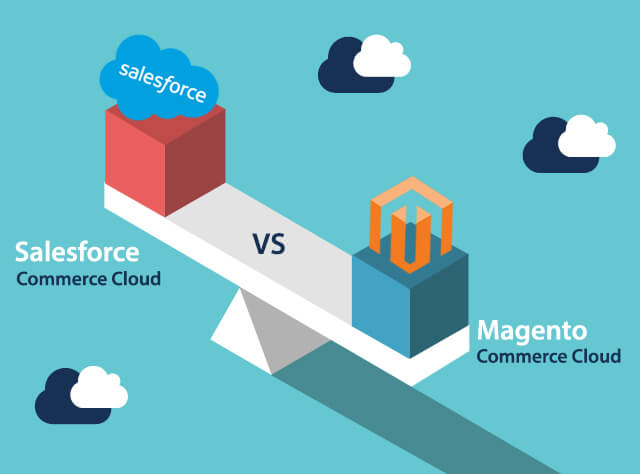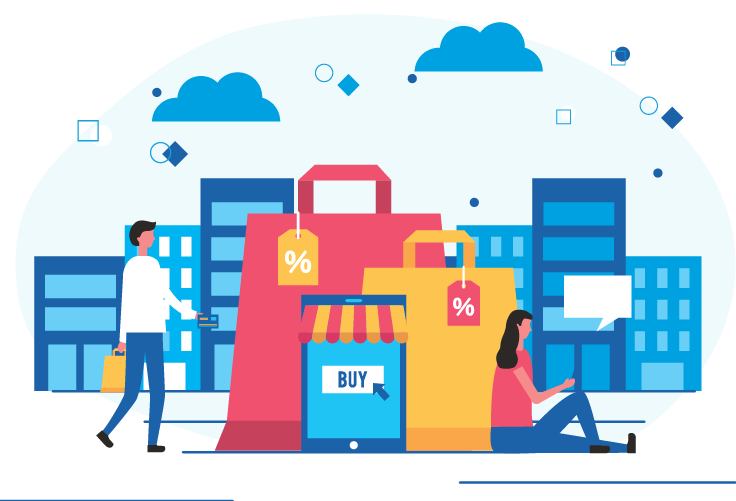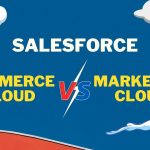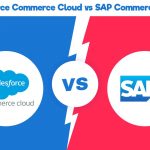Magento vs Salesforce Commerce Cloud: What is the Difference
Last Updated | October 10, 2023
Table of Contents
The eCommerce industry has travelled a far distance. It continues to serve as a honeypot for several corporations. By the end of 2022, the total revenue from e-commerce will be $5.4 trillion. The $2.3 trillion in 2017 has increased significantly to that amount.
You should think about Magento vs Salesforce Commerce Cloud.
Both platforms give small, medium-sized, and large businesses the chance to advertise and display their goods on gorgeous websites with lots of customization.
Read about top Salesforce trends that will help businesses keep up with all the latest Salesforce future developments
We’ll learn about Magento vs Salesforce Commerce Cloud in this article. We’ll also go over some of the key distinctions between the two platforms so you can decide which one would be more beneficial for you.
Although both Salesforce and Magento are excellent eCommerce platforms, there are some significant distinctions. They are capable of meeting various business requirements.
So, let’s get going.
Read this blog that discusses Salesforce Commerce Cloud Vs SAP Hybris debate with an in-depth overview of both SFCC and Sap hybris.
A Major Overview Magento (Adobe Commerce)
Online retailers can tailor the style, feel, and operation of their online store using the Magento 2 platform, which also offers a configurable shopping cart purchase mechanism. Strong options for SEO, promotion, and catalogue management are provided by Magento.
One of the most significant ways whereby major players adopt this attitude of always upgrading their product offerings is through mergers and acquisitions. The global software giant Adobe is also not an exception to this way of conducting business.
Compare the similarities and differences between Salesforce Commerce Cloud vs Demandware
Adobe is nearly finished with an integration that has been ongoing in the backstory for some time; this integration will produce an aggregated Adobe Commerce brand that will benefit both their business and yours.
Questions about scaling commerce? Read this article Salesforce eCommerce integration and What is Salesforce Commerce Cloud Pricing? The Ultimate guide to having a better understanding of the topic.
A Major Overview Salesforce Commerce Cloud
Salesforce commerce cloud is an integrated, mobile-first cloud-based eCommerce platform created as a SaaS solution for businesses.
The main goal is to make it possible for customers and retailers to interact on many channels seamlessly.
Read about How To Go Headless With Salesforce Headless Commerce
It becomes even better when you get Salesforce Commerce Cloud development done by a Salesforce Commerce Cloud consultant.
Salesforce defines Commerce Cloud as follows:
Salesforce B2B Commerce Integration and Salesforce B2C commerce developer are the top solutions in the world.
A multi-tenant, cloud-based platform for commerce called Commerce Cloud enables organizations to design intelligent, unified purchasing experiences across all channels, including mobile, social, web, and stores.
Commerce Cloud has developed into another essential and potent service provided by Salesforce over the past few years.
What Are The Key Differences Between Magento (Adobe Commerce) and Salesforce Commerce Cloud: Detailed Comparison
-
Popularity Of Marketplace
When contrasting Magento with Salesforce, their respective market prominence is the most crucial distinction. This contest favors Magento. More than 250,000 merchants utilize it globally.
Even though Salesforce has a sizable market share, it is still behind Magento. Globally, Salesforce Commerce Cloud has been embraced by about 150,000 merchants.
-
Features – Magento vs Salesforce Commerce Cloud
Both Salesforce and Magento offer unique feature sets. Therefore, it is difficult to say which is superior. Let’s go over each feature individually.
-
Magento
Magento (Adobe Commerce) is a feature-rich platform that provides store owners with exceptional flexibility and control. Product management, payment gateways, shipping, and tax are just a few of the capabilities you might anticipate from an eCommerce platform.
Read also: Magento Vs Hybris: Which eCommerce Platform Is Best?
Additionally, Magento provides functionalities like:
-
Multi-Store Administration
You may design many stores with various branding, goods, and prices.
-
Ahead Of Time Check
Customers can store their shipping and payment details for upcoming transactions.
-
Item Filtration
Customers can use this tool to filter products based on categories, brands, pricing, and special offers.
-
Customers Segmentation
You can also use personalized advertising to target particular clients.
-
Scalability
A scalable platform is Magento. It is capable of managing massive volumes of transactions and traffic.
-
Salesforce Commerce Cloud
Additionally, Salesforce Commerce Cloud provides a ton of additional functions, such as:
-
Einstein
Not Albert, but rather the in-house AI recommender system at Salesforce. Machine learning is used to fuel its advanced features, which are intended to improve the efficiency of automated marketing and suggestions.
Read Also Tailor Brands vs Shopify
-
365 Products
A thorough overview of all products from different sources in one location, complete with product information, photos, descriptions, and customer reviews.
-
Bilateral Trade
Supports business-to-business purchasing and selling activities with integrated EDI, contract management, and approvals workflows.
-
Management & Merchandising Catalogs
With tools for operating variants, rich media, and rules-based merchandising, it aids shops in the creation, management, and optimization of product catalogues.
-
Price
Even though Salesforce has typically been the more expensive choice, they recently changed their pricing to make it a bit more competitive and available to smaller businesses.
Despite this, it’s quite challenging to compare the price of developing and maintaining websites on Magento and Salesforce. The degree of modification needed, the accessibility of integrations, and gross merchandise value are just a few of the variables that will affect it.
Both Magento vs Salesforce Commerce Cloud require professionals to build or migrate your site, and both have scalability cost that is based on your sales volume.
-
Hosting
Magento is a self-hosted platform. It implies that your server must host it. Small firms who lack the technical know-how to set it up and manage it may find this challenging.
However, Salesforce itself hosts the Salesforce Commerce Cloud. As a result, starting a business with it is made simpler. You don’t have to worry about managing or hosting it.
-
Dexterity
Compared to Salesforce Commerce Cloud, Magento is a more adaptable platform. Retailers can adapt their stores to their specific demands thanks to it. This allows companies greater control over the activities of their online stores.
Magento offers more flexibility than Salesforce Commerce Cloud. It does not let enterprises alter it to suit their requirements. For businesses that seek more control over their e-commerce operations, this could be a drawback.
-
Cost Of Development
Salesforce Commerce Cloud is less expensive to construct than Magento. This is because the platform is more complicated and calls for greater development knowledge.
Compared to Magento, Salesforce Commerce Cloud is less expensive to develop. It is a less complicated platform that necessitates less development knowledge.
-
Security
Compared to Salesforce Commerce Cloud, Magento is a more secure platform. It has passed numerous independent security organizations’ tests and certifications. Businesses can use Magento with confidence knowing that their data is secure because of this.
Magento is more secure than Salesforce Commerce Cloud. There have been a few security issues that have caused corporations to express worry.
-
Integrations
Compared to Salesforce Commerce Cloud, Magento is a more open platform with more integrations. It can be integrated with a wide range of programs, servers, and services. Businesses now have additional options for the applications they may utilize with it.
Read Also Shopify Plus vs Shopify Advanced
The integrations for Salesforce Commerce Cloud are few. There aren’t many platforms and applications that it integrates with. For firms that want to employ more sophisticated applications, this could be a drawback.
Magento vs Salesforce Commerce Cloud – Which One Is Best For Your Business Needs
Magento is the best platform for creating online businesses and currently rules the online retail industry. The most recent statistics show that 12% of all eCommerce websites and 1.2% of the internet are powered by Magento.
For businesses wishing to build up an e-commerce website, Magento is the superior platform. Despite a few limitations, utilizing Magento has more advantages than disadvantages.
You Might Want To Read These Articles:
1) Salesforce Commerce Cloud B2B Vs B2C
2) Salesforce Commerce Cloud integration
3) Salesforce Commerce Cloud for online business
Final Words
Magento is, all things considered, a superior platform to Salesforce Commerce Cloud in our debate Magento vs Salesforce Commerce Cloud. It has more features, is more reasonably priced, and provides superior customer service. Compared to Salesforce, it is also more adaptable and secure.
Magento is superior to Salesforce Commerce Cloud in every way. In comparison to Magento, it is more expensive, offers fewer integrations, and is less flexible. Additionally, it does not provide superior customer service as Magento provides.
Therefore, to begin developing an online store, employ an Indian Magento development company. You’ll be able to gain more from using this platform as a result.
FAQs:
Which is better salesforce or Magento?
The Software as a Service (SaaS) foundation on which Salesforce Commerce Cloud is built is essential to cloud computing solutions.
For both your online and offline activities, this offers continuous access to real-time information. As a result, the sales management process works well.
Due to this, Salesforce Commerce Cloud is a superior choice to Magento, a platform as a service (PaaS).
Otherwise, it also depends on the needs and niche of your business to decide which is better for its growth.
Is Adobe commerce cloud the same as Magento?
An eCommerce platform as a service is Magento Commerce. In April 2021, Magento Commerce got acquired by Adobe and changed its name to Adobe Commerce as part of a long-term endeavor to combine the acquired Magento sales, marketing, and product teams into the Adobe Commerce Cloud business unit.
Is Magento the best eCommerce platform?
Magento is dominating the online retail sector and is the top platform for building online stores. According to the most recent data, Magento powers 1.2% of the internet and 12% of all eCommerce websites.
Tailor Brands vs. Shopify: Making the Right Choice for Your E-commerce Venture
How good is Salesforce Commerce Cloud?
Salesforce is a reliable platform that is secure by default. It is a widely used platform that complies with regional laws as well.
The payment gateway and third-party application integration are both outstanding. It provides us with a distinctive digital experience and is available to all systems everywhere, anytime.













